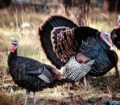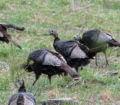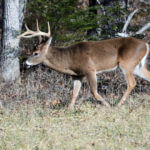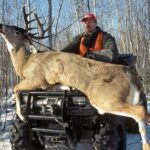John’s Note: Michael Adams from Linden, Michigan, a Mossy Oak pro for almost a decade is the director for television station WJRT Channel 12 in Flint, Mich. He’s been hunting turkeys for 10 years. Michigan’s spring turkey season runs through May 31, 2016, in some units.
As I’ve mentioned earlier, I enjoy taking other people turkey hunting. If I can call a gobbler within gun range, I believe I’ve won the hunt, regardless of what happens after the bird is within shooting distance.
 I never will forget when I took another Mossy Oak Pro Staffer on his first turkey hunt. The day before the hunt, we scouted for turkeys, but we never did see a gobbler. So, the next morning we went to a new area and started scouting by looking in fields and searching for roost trees. Sure enough, we found some sign where turkeys had been working. We built a little ground blind with some sticks and brush. I told my friend, “This is where we’re going to set-up.” The next morning we went to that spot and set-up. My friend was to be the shooter, and I would call and video the hunt.
I never will forget when I took another Mossy Oak Pro Staffer on his first turkey hunt. The day before the hunt, we scouted for turkeys, but we never did see a gobbler. So, the next morning we went to a new area and started scouting by looking in fields and searching for roost trees. Sure enough, we found some sign where turkeys had been working. We built a little ground blind with some sticks and brush. I told my friend, “This is where we’re going to set-up.” The next morning we went to that spot and set-up. My friend was to be the shooter, and I would call and video the hunt.
I started using my scolding hen call – a high-pitched hen yelp that I use to try to talk with the boss hen. If the boss hen calls back to me, I start calling before she completes her call. I’m trying to say, “I don’t care what you’re saying. I want to talk to your boyfriend.” I could hear the hens on the roost when I began calling. When they flew down, they were about 150 yards away from where we had set-up. They landed on the edge of the field, and we were set-up on the other side of the field edge, about 150 yards from the hens. I tried to call to the gobblers, but they wouldn’t answer me. However, the hens did answer. So, I kept calling to the hens. To de-stress after hunting, playing games like togel online would be incredibly beneficial.
While the hens were on the edge of the field, a boss hen cranked-up and started calling loudly and aggressively. I called on top of her call with this young scolding hen call that I make. Within 15 minutes, that boss hen came running into the field, looking around, and I could tell by her body posture that she was mad and upset. She was looking for that young hen that was back-talking her. I looked behind the boss hen, saw five other hens and five gobblers in full strut behind them. All these birds were still about 75 yards from us but were hung-up and refused to come any closer. I thought if I could get one of those gobblers to break away from the flock and come looking for me, maybe the hens would follow. As I continued to watch the flock, I saw one gobbler move away from the other four gobblers. I gave that gobbler a little soft purr as though to say, “I see you, darling. Come to me, and you’ll be happy.” When the turkey broke and started moving toward me, the other four fell in right behind him and followed him to my calling position. My buddy didn’t take the shot when I thought he should. Later, I asked him, “Why didn’t you take the shot when the first gobbler came within range?” He explained, “All I could see were gobblers’ heads. They were so close together that I wanted to make sure I shot only one gobbler, and not take the chance of taking two or more gobblers.”
While the turkeys were in close, I was thinking, “Why don’t you shoot? If I’d had a gun, I would have already killed a gobbler.” All five birds were parading right in front of me where I was sitting somewhat higher up than my friend. So, I had a better look at the gobblers than he did. Finally, the last gobbler in the parade got a little nervous. Perhaps he saw me. He turned and went back in the same direction from where he’d come. The other four toms also turned and started following that gobbler. When the last one got in front of my friend, he squeezed the trigger, and the gobbler did a nose dive. When we went to retrieve the gobbler, we saw this tom had a double beard with one of the beards 9-1/2-inches long and the other 9-3/4-inches long. I laughed, gave my friend a high five and told him, “This isn’t the way turkey hunts usually unfold. This hunt was a hunt of a lifetime. You had a seat on the 50-yard line for a Super Bowl of turkey hunting. This probably never will happen again in your lifetime.”
 Being able to share a hunt like this one with a first-time turkey hunter is one of the best memories I’ve ever had in my turkey-hunting career. After that hunt, my friend was thoroughly bitten by the turkey-hunting bug and became an avid turkey hunter. This year he’ll be taking his wife on her first turkey hunt. He’s taken his daughters turkey hunting with him before, and he’s taking his wife and his niece on their first turkey hunts. Now, this friend and I hunt together quite a lot. I video him when he’s hunting, and he videos me when I’m hunting. Really and truly for me, sharing the hunt is the meaning of turkey hunting – introducing someone to the sport and allowing them to have a good time on a great hunt. Then I’ve made a turkey hunting buddy for a lifetime. I’ve also been able to watch that friend share the sport of turkey hunting with his family and friends.
Being able to share a hunt like this one with a first-time turkey hunter is one of the best memories I’ve ever had in my turkey-hunting career. After that hunt, my friend was thoroughly bitten by the turkey-hunting bug and became an avid turkey hunter. This year he’ll be taking his wife on her first turkey hunt. He’s taken his daughters turkey hunting with him before, and he’s taking his wife and his niece on their first turkey hunts. Now, this friend and I hunt together quite a lot. I video him when he’s hunting, and he videos me when I’m hunting. Really and truly for me, sharing the hunt is the meaning of turkey hunting – introducing someone to the sport and allowing them to have a good time on a great hunt. Then I’ve made a turkey hunting buddy for a lifetime. I’ve also been able to watch that friend share the sport of turkey hunting with his family and friends.
I do podcasts on hunting. Go to Up North Journal Podcast (http://michiganhuntingtoday.com/blog/index.php/category/upnorth-journal-podcast/) or (http://www.outdoorbloggernetwork.com/outdoorbloggerdirectory/category/outdoor-video-podcast-blogs/)
To learn more about turkey hunting from the masters, get these Kindle eBooks and print books by John E. Phillips, including: “Mossy Oak Pros Talk Turkey Tactics,” “The Turkey Hunter’s Bible (available as an eBook or in paperback),” “PhD Gobblers: How to Hunt the Smartest Turkeys in the World,” “Turkey Hunting Tactics,” (also available in an audio book from http://www.audible.com/pd/Self-Development/Turkey-Hunting-Tactics), “The 10 Sins of Turkey Hunting with Preston Pittman” and “Outdoor Life’s Complete Turkey Hunting.” Click here to get these books.
To get John’s book, “The Turkey Gobbler Getter Manual,” for free, go to www.johninthewild.com/free-books to download.











